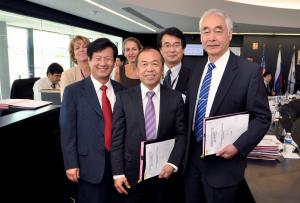Aligning requirements for Procurement Arrangements
16 Jul 2014
-
Paola Miele, Procurement & Contract Division
During the Fourteenth ITER Council on 19 June three Domestic Agencies—China, Japan and Korea—concluded Amendments that align all signed Procurement Arrangements with the current Applicable Documents.
Since the start of the ITER Project, 99 Procurement Arrangements have been signed—the first back in November 2007 and the most recent in February 2014.
Procurement Arrangements are the documents concluded between the ITER Organization and the seven ITER Domestic Agencies authorizing work for the design, manufacturing and installation, when applicable, of components and systems, or the design and construction of buildings. In essence, Procurement Arrangements are the "work packages" on the road to realizing ITER.
Through the main document and several annexes, each Procurement Arrangement details all of the necessary technical and management specifications. The management requirements are defined in several Applicable Documents that are common to all Procurement Arrangements and describe the main ITER Organization processes governing execution such as quality assurance, safety, licensing, scheduling, change management, risk management, data management, design integration, environment and health.
Since the early days of the ITER Organization these documents have evolved. New procedures, plans, policies and templates have been produced and updated over time as part of the ITER Organization Management & Quality Program (MQP) aimed at harmonizing and streamlining the Procurement Arrangement process.
Together, the ITER Organization and the Domestic Agencies are seeking to align all signed Procurement Arrangements with the current Applicable Documents. This is particularly important for the first Procurement Arrangements signed in 2007 or 2008 when no procedures, plans and templates were yet in place with the exception of early quality assurance documents.
To this end a global action was launched in the summer of 2013 to arrive at Procurement Arrangement Amendments that update the Applicable Documents relative to each work package.
Seven global Procurement Arrangement Amendments—one per Domestic Agency—cover all signed Procurement Arrangements. At last week's Fourteenth ITER Council, three Amendments were signed with China, Japan and Korea. A fourth Amenment had been signed on 27 May with Russia; together these four Amendments cover a total of 43 Procurement Arrangements.
The next step is the closure of this global action with the signature of the remaining three Procurement Arrangement Amendments with Europe, India and the US.


